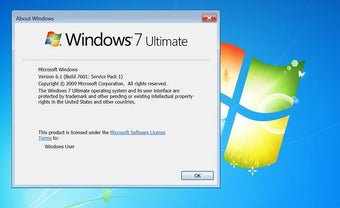A full version app for Windows, by Microsoft.
Screenshots
Windows 7, a legendary operating system, remains a standout choice for millions of users seeking reliability, performance, and familiarity in their computing experience. Renowned for its robust functionality and intuitive interface, this OS continues to hold a special place in the digital landscape and here is why.
A quick reminder to Windows 7
Windows 7 is an operating system developed by Microsoft, characterized by its user-friendly design, enhanced performance, and versatile features. It succeeded Windows Vista, introducing a refined user interface, improved taskbar, and streamlined functionality.
Windows 7 is renowned for its stability, performance, and wide software compatibility, making it a reliable choice for various computing needs. Its efficiency in handling tasks, from casual browsing to resource-intensive applications, remains commendable.
The Windows 7 user experience is highly praised for its intuitive design, customizable features, and overall ease of use. Its compatibility with a wide range of devices contributes to a positive user experience.
Can I still use Windows 7 in 2023?
Technically, you can still use Windows 7 in 2023, but it's essential to understand the implications of using an operating system that's no longer supported by Microsoft.
Microsoft officially ended support for Windows 7. This means that the company no longer provides security updates, bug fixes, or technical assistance for this operating system. Without these updates, your system becomes more vulnerable to security threats, viruses, and other malicious software. Over time, this can pose significant risks to the security and stability of your computer.
Continuing to use Windows 7 after its end of support exposes your system to potential security vulnerabilities that may not receive patches or fixes from Microsoft. While the OS may still function, the lack of security updates leaves your computer susceptible to new and evolving threats.
Windows 7 features
Here are the reasons why people still use Windows 7:
- User-friendly interface: Windows 7 boasts a polished and user-friendly interface, simplifying navigation and accessibility for users of varying technical expertise.
- Enhanced performance: It offers enhanced speed and responsiveness compared to its predecessors, providing a smoother user experience.
- Libraries and file organization: The introduction of Libraries streamlined file organization, making it easier to access and manage various file types.
- Windows Aero: The Aero graphical interface brought visually appealing features like translucent windows and smoother animations.
- Enhanced security: Improved security measures including Windows Defender and User Account Control added layers of protection against threats.
Windows 7 system requirements
Windows 7 had moderate system requirements at its release but might struggle with modern software and hardware demands. Minimum requirements included a 1 GHz processor, 1 GB RAM (32-bit) or 2 GB RAM (64-bit), and 16 GB of hard disk space.
Windows 7 vs Windows 10
Windows 7 stands as a predecessor to Windows 10, offering a different user interface and feature set. Windows 10 introduced ongoing updates, enhanced security measures, and a more modern interface.
Can I get a Windows 7 ISO file?
Certainly! You have the option to download a Windows 7 ISO file, but keep in mind that a valid Product Key is required for activating Windows 7 post-installation.
Windows 7 still living in 2023
Windows 7, despite its age, remains an iconic operating system appreciated for its stability, performance, and familiarity.
While no longer officially supported, its performance and familiarity continue to resonate. Discover the evolution of operating systems today!


